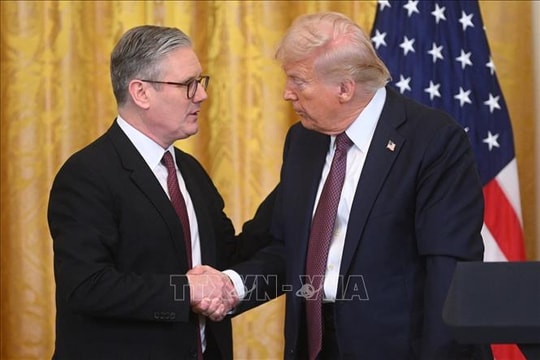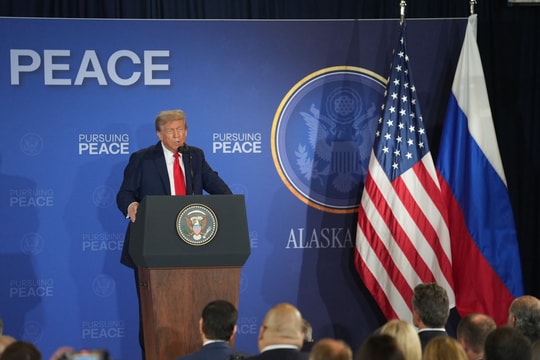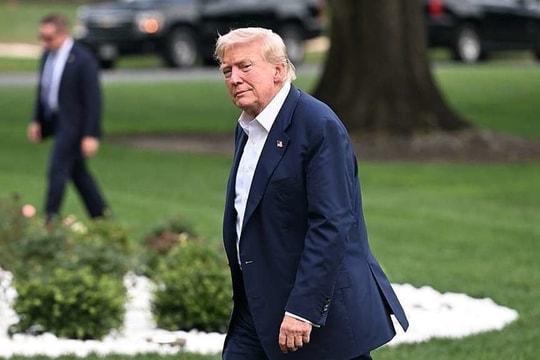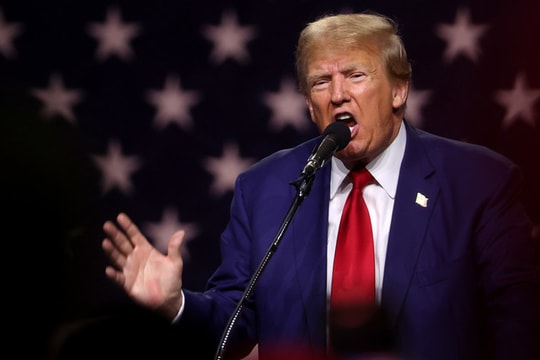The cost of US military escalation in Syria
(Baonghean) - The images that are dominating American news pages look like a nightmare. Children gasping for breath, chests heaving in pain, foam coming out of their mouths… these are images from Douma, one of the last strongholds of the opposition rebels opposing the Assad regime’s recapture of Syrian territory.
 |
| President Donald Trump. Photo: Reuters |
And then, as if in chorus, the piercing wails filled the mainstream American news channels, accompanied by self-righteous voices in lengthy articles, calling for a new war in Syria under the guise of moral outrage but with the ultimate goal of regime change.
On April 9, just a few days after announcing that the US would withdraw its troops from the Syrian "stage", President Donald Trump criticized the Bashar al-Assad regime in Syria and its allies Russia and Iran, while promising a quick and strong military response to the recent suspected chemical weapons attack.
At the same time, the office of Michael Cohen - Mr. Trump's personal lawyer - was raided by the Federal Bureau of Investigation (FBI). Meanwhile, Israeli aircraft attacked the T4 base of Syrian and Russian forces, while France and Britain responded to the call for war.
According to AsiaTimes, it is in such moments, when the fog of emotion is being blown up by powerful political and media forces trying to create public consensus, that it is crucial to step back and analyze the narrative being pushed and examine exactly what the US benefits are in going to war again in the Middle East.
Looking into the future?
It is clear that the recent chain of events is almost identical to the case of previous attacks blamed on Assad in 2017 in Khan Shaykhun and before that in 2013 in Ghouta.
In each event, Assad was immediately branded the guilty party before any facts could be proven, and in fact, it went against all logical motivations from his position.
Of course, along with that “judgment” came a long call for immediate and large-scale military intervention to strip Assad of power.
However, despite the considerable pressure forcing the White House to make a hawkish response, both Barack Obama and Trump in the previous two events tried to prevent the US from sinking deeper into the conflict.
 |
| A baby breathes through an oxygen mask after an attack in the city of Douma, near Damascus, Syria. Photo: AP |
Their actions were vindicated a few months later, when the UN investigation team in both cases concluded that there was no evidence that Assad had deployed nuclear weapons, thereby reinforcing allegations that the attacks were a “false flag” operation by rebel forces seeking Western military support.
The Assad regime and its Russian allies have made major efforts in recent years to win Syria's long-running civil war. In Douma, the opposition is surrounded and making a last, feeble stand before victory knocks on Syria's doors.
In that context, a chemical attack masterminded by Assad would only open the way to Western military sanctions, and would amount to political suicide, going against all logical motives.
The war mongers completely ignore this simple logic, instead insisting on demonizing Assad. But even the devil wants to win, and an Assad-instigated chemical attack now only threatens his imminent victory.
There is obviously no compelling reason for Assad to resort to such deadly weapons.
Now Washington is facing an unprecedented situation, as Trump – who as a presidential candidate criticized all forms of military intervention, which he now supports – faces an unprecedented challenge to his office by the very government agencies he is supposed to control.
 |
| Syrian President Assad visits soldiers in Eastern Ghouta. Photo: EPA |
Already weakened by a series of scandals involving allegations of collusion with Russia and details of his unsavory sexual past, the recent raid on Michael Cohen's office and violation of attorney-client privilege has opened the door to possible impeachment of Trump.
These developments coincide with the promotion of John Bolton, a notorious hawk obsessed with endless conflicts, to the position of national security adviser. Thus, it can be said that there is enough foundation for a long-term escalation of US military intervention in the Syrian battlefield.
America does not benefit
This is a moment when every American should ask themselves, what exactly do they have to gain from the war in Syria? Is American security, or rather the security of the West, improved by military escalation in Syria?
Clearly, the evidence of years before the turmoil in Syria created a wave of migration into Europe at the behest of the German Chancellor proved otherwise.
Recent history shows that war only creates more migrants, more chaos, more radicalism, and more opportunities for terrorism.
Would overthrowing the Assad regime improve peace in the region? Again, the evidence suggests otherwise. Despite its flaws, the Assad regime has been a force for secularism in a region where religious extremism is rife.
A Syria without Assad would be a chaotic theater where the Islamic State (IS) and other Islamist extremists would fill the power vacuum, turning the country into a training ground for future terrorists who could come and haunt the United States and other Western countries.
In fact, we have seen this cycle countless times before, in Afghanistan, Iraq and Libya, and now it is essential not to repeat the mistake.
Has the war in Syria increased American prosperity? Once again, the US must remind itself that the $6 trillion it spent on the Iraq war may be one of the biggest geopolitical mistakes in modern history.
According to the 2017 US federal budget, spending on health care and healthcare totaled $1.17 trillion, transportation $109 billion, education $85 billion, and science $32 billion. These figures are dwarfed when placed next to the spending on the Iraq war.
That money could have been spent on universal health insurance, a national high-speed rail system, improved education systems and increased government support for scientific research many times over.
The Arrogance of an Empire
At a time when the US public debt exceeds $21 trillion, the economy is increasingly unstable amid rising living standards and unprecedented economic and social divisions that challenge American society, a war in Syria should not be on the list of priorities.
Another war in the Middle East, allowing the United States to overthrow another secular government to create a power vacuum for Islamic extremists, will not improve the security of the American people, but will cause more harm.
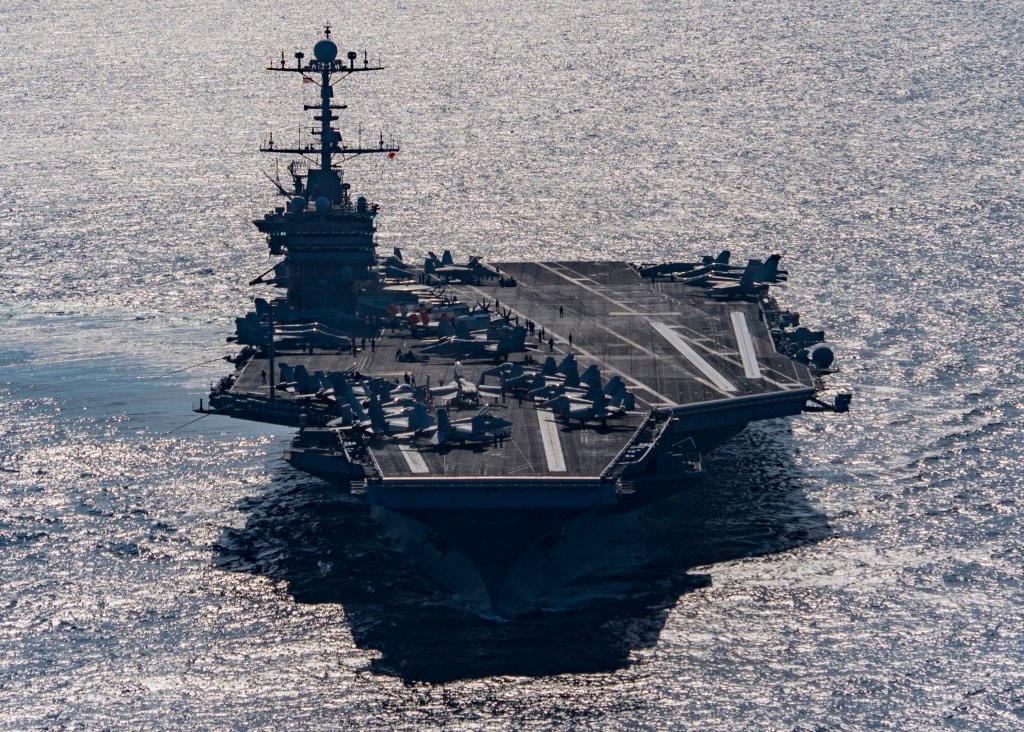 |
| The aircraft carrier USS Harry S. Truman has left its home base in Norfolk, Virginia, and is en route to the Middle East. |
Another war in the Middle East would not increase American prosperity, but would only bring more damage. It would significantly increase the US public debt, reducing valuable resources for investment in the critical infrastructure needed to maintain economic competitiveness.
Another Middle East war that would bring the US to the brink of war with Russia, a nuclear power, for what? So that the US could play the role of arbiter and choose the leader in the endless geopolitical struggles between Iran, Saudi Arabia and Israel, thousands of kilometers away from the land of the stars and stripes?
History has shown that the more arrogant and haughty an empire is, the more likely it is to collapse. Through excessive expansion of power and reckless adventure, often manipulated by elites with a fog of emotion and anger to galvanize the public to support their own far-reaching goals, empires have embarked on a long journey to collapse.
In this information age, there is no excuse for ignorance. Nothing can justify a citizen supporting a national effort that threatens his own interests.
The Syrian war is clearly not in America's interest, and a major military escalation would only lead to catastrophic consequences.

